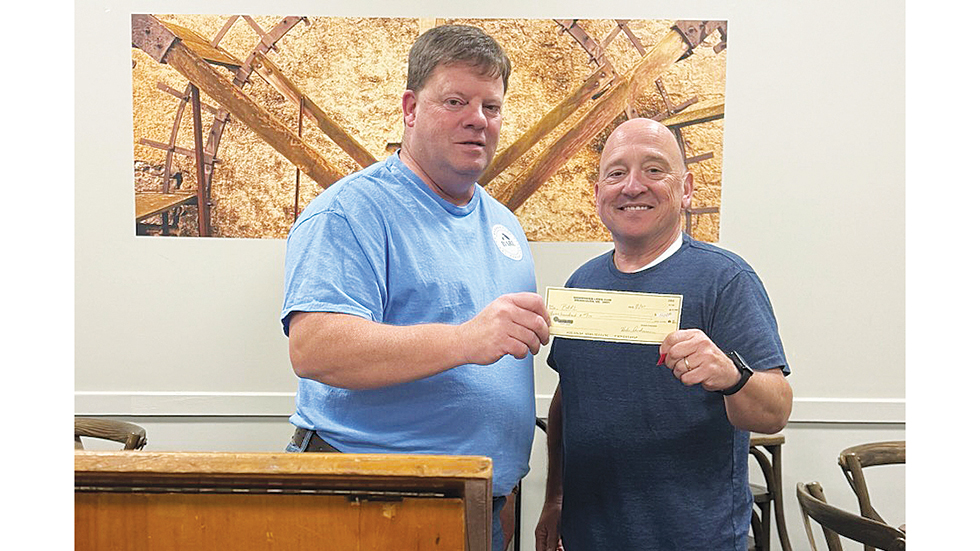Tracking back: Hen survival, gobbling data suggest turkey seasons need change
Published 9:39 am Saturday, April 29, 2023

- A hen scratches for food in a food plot in Lincoln County. (Hunter Cloud's Trail Camera | The Daily Leader)
JACKSON — Mississippi’s turkey program met with a focal group of several dozen people from hunting, wildlife and habitat management backgrounds to determine the best way to address the turkey decline. Butler said one of the things the groups agreed on was the season structure needed a change.
Focal group respondents suggested the current season framework, open March 15 to May 1, is too early and too liberal for the state. A suggestion uniform across the groups, Butler said. MDWFP determined it needed to evaluate what they were doing and Butler wanted to make changes based on data.
They first started with Game Check, a mandatory online reporting system for turkeys, to collect data on where, when and how many turkeys are harvested. MDWFP took different pairs of Wildlife Management Areas and set one as a control and closed the other for turkey season until April 1.
Trending
In addition, Mississippi State University provided a harvest model project to provide a forecasted look at how different changes would affect the turkey population over the long term. Butler said in the February meeting their changes in the spring season at the WMAs and in the forecast model had a limited impact on wild turkey numbers.
Forecast models and research conducted in other parts of the country documented the sensitivity of turkey populations to fall and winter hen survival. Mississippi’s fall season allows hens to be legally harvested. MSU’s data illustrated a 2 percent increase in hen survival by eliminating a fall season thus increased populations by 2.5 times.
Eliminating the fall season would also protect gobblers for the upcoming spring season and protect jakes who by then could have grown eight inch beards and fit the bill of a Tom. Harvest of male birds in the fall is counter-intuitive to the management goals, Butler said.
He also made recommendations to shorten the spring season by about a week to line up with gobbling activity in order to help improve hunter success and close the fall season. March 23 is the day you are most likely to hear a turkey gobble according to gobbling activity data.
Mississippi is one of the final southern states to make a change to its spring season and one of the more conservative in approach. Tennessee for example opened its season on April 12 this year. Butler said he wanted to balance hunter success, keeping Mississippi’s early and long season while doing what is best for the resource.
“I’m proud we took a deep dive and looked at every aspect of the season’s frameworks. Ultimately, we came down to where we are at,” Butler said. “The really dramatic changes we struggle to see how it would make a difference. On the flip side, we have good data. Hunters were successful under the old frameworks even with controls for fluctuating habitat and bird populations. If we don’t make more turkeys we can get more out of them. We believe we have heard the public’s concern and feel the decisions are warranted but real dramatic changes are not.”
Trending
Tennessee Turkey Program Coordinator Roger Shields said the turkey harvest early in their season was up quite a bit compared to previous seasons after changing opening dates. In the first 16 days of the season, hunters have bagged 21,888 turkeys, an increase from the 2022 season which opened on April 5. Hunters bagged 15,322 birds in the first 16 days of the 2022 season.
An increase in harvest could be due to the poult per hen (pph) figures being higher than the five year average. 2021 hatch data showed 2.22 pph and 2022 had a hatch of 2.19 pph above the five year average of 1.7 pph. 2020 hatch data shows Tennessee had 1.4 pph. Shields said hunter success early in Tennessee could be due to a few other reasons.
“In 2021 we had a good hatch and expected more mature birds. We had a good crop of two year old birds coming into the season and opening weekend was good weather wise as was the youth opener,” Shields said. “This past weekend was cool but was nice. The last three weekends have allowed hunters to get out and hunt. It could be birds have gobbled well and they seem to respond well to calls. They aren’t henned up due to starting two weeks later. I often tell folks I hate to say too much in one year because there are so many variables.”
Good weather and a good hatch could have helped Tennessee this year or it could be a result of the season moving back. Shields said he would like to see more years of data.
Check back tomorrow for the final part of a three-part series on Mississippi’s turkey season changes. Email questions or feedback to hunter.cloud@dailyleader.com.





